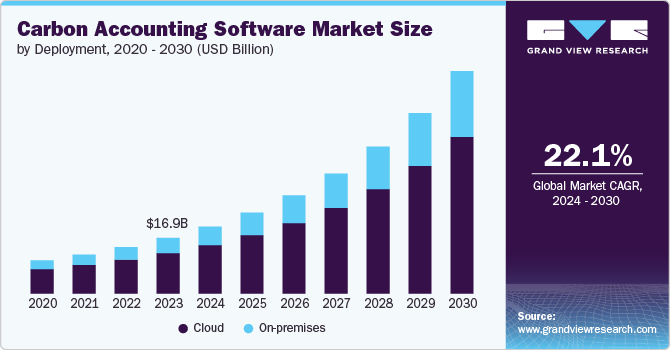Carbon Accounting Software Market Trends
The global carbon accounting software market size was estimated at USD 16.92 billion in 2023 and is expected to grow at a CAGR of 22.1% from 2024 to 2030. This is driven by increasing global awareness and regulatory pressure to reduce carbon emissions and address climate change. Organizations across various industries are adopting carbon accounting software to accurately measure, track, and report their carbon footprints. This software facilitates compliance with stringent environmental regulations and supports corporate sustainability initiatives by providing real-time insights into carbon emissions across operations.

To learn more about this report, request a free sample copy
The rise in demand for transparency in environmental reporting, coupled with the growing adoption of ESG (Environmental, Social, and Governance) standards, is further propelling market expansion. Additionally, the integration of advanced technologies such as AI, machine learning, and IoT into carbon accounting solutions is enhancing their capabilities, making them more efficient and user-friendly.
The increasing emphasis on corporate sustainability is driving businesses to emphasize their environmental initiatives. Carbon accounting software enables companies to transparently monitor and report their carbon footprint, showcasing their dedication to sustainability and appealing to eco-conscious consumers and investors. The market is also benefiting from the increasing adoption of cloud-based solutions, which offer scalability and ease of access, making carbon accounting more accessible to small and medium-sized enterprises. With the ongoing global shift towards sustainability and the decarbonization of industries, the carbon accounting software market is poised for robust growth in the coming years, playing a crucial role in helping businesses meet their environmental objectives.
Moreover, many governments and regulatory bodies mandate organizations to report their carbon footprint and greenhouse gas (GHG) emissions as part of strict environmental regulations or voluntary initiatives like the Carbon Disclosure Project (CDP) or the Task Force on Climate-related Financial Disclosures (TCFD). Carbon accounting software aids organizations in meeting these regulatory requirements and standards by offering standardized reporting templates and efficient data management tools. These factors are generating significant opportunities for the adoption of carbon accounting software in the market.
Regional Insights
North America carbon accounting software market dominated with a revenue share of over 37.0% in 2023. U.S. and Canadian governments have implemented rigorous reporting requirements for greenhouse gas emissions, compelling organizations across various industries to adopt carbon accounting software. Additionally, the growing focus on ESG practices among North American companies has driven demand for advanced tools to monitor and report carbon emissions. The presence of major market players and a high level of technological adoption in the region further contributed to North America’s high share of the market. These factors, combined with increasing investor and consumer pressure for transparency in sustainability efforts, fueled the widespread adoption of carbon accounting solutions.
U.S. Carbon Accounting Software Market Trends
The U.S. carbon accounting software market is expected to grow significantly from 2024 to 2030. As the U.S. government enforces stricter environmental regulations and carbon reduction targets, businesses across various sectors are increasingly adopting carbon accounting software to ensure compliance and enhance their sustainability reporting. The U.S. market also benefits from a robust tech ecosystem, which facilitates the development and adoption of innovative carbon accounting solutions and contributes to the anticipated high growth rate.
Europe Carbon Accounting Software Market Trends
The carbon accounting software market in the European region is expected to witness significant growth over the forecast period. The European Union’s ambitious climate goals, such as the European Green Deal and the commitment to becoming carbon-neutral by 2050, are pushing organizations to adopt advanced carbon accounting solutions. The region’s proactive approach to environmental responsibility, coupled with government incentives and support for green technologies, is fueling the rapid adoption of carbon accounting software, leading to significant market growth during this period.
Asia Pacific Carbon Accounting Software Market Trends
The Asia Pacific carbon accounting software market is anticipated to register rapid growth over the forecast period. As countries like China, India, and Japan implement stricter environmental regulations and carbon reduction initiatives, businesses are increasingly adopting carbon accounting software to comply with these requirements and reduce their environmental impact. The growing awareness of climate change and the need for sustainable practices among corporations in the region is also contributing to this trend.
Key Carbon Accounting Software Company Insights
Key companies include IBM Corporation, SAP SE, Salesforce, Inc., and Microsoft. These companies are focusing aggressively on expanding their customer base and gaining a competitive edge over their rivals. Hence, they pursue various strategic initiatives, including partnerships, mergers & acquisitions, collaborations, and new product/ technology development. For instance, in June 2024, Workiva introduced a carbon solutions platform to help clients meet increasing climate-risk reporting and global disclosure requirements. The newly established “Workiva Carbon” subsidiary will gather data from companies’ management systems and monitor greenhouse gas emissions from their operations. This platform enables businesses to automatically calculate their carbon footprint, covering scope 1, 2, and 3 emissions.
Key Carbon Accounting Software Companies:
The following are the leading companies in the carbon accounting software market. These companies collectively hold the largest market share and dictate industry trends.
- IBM Corporation
- SAP SE
- Salesforce, Inc.
- Microsoft
- Persefoni AI
- Sphera
- Greenly
- Diligent Corporation
- SINAI Technologies
- Net0.